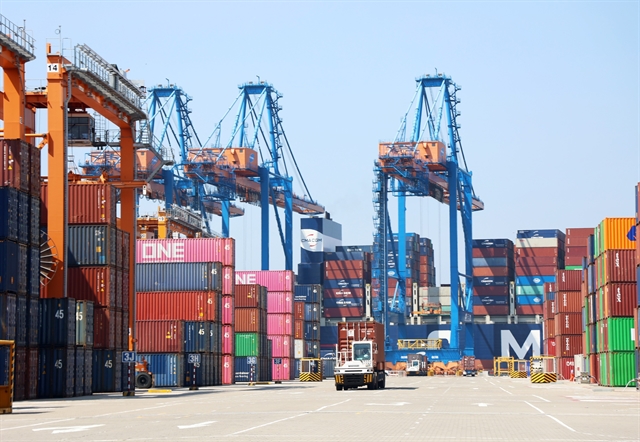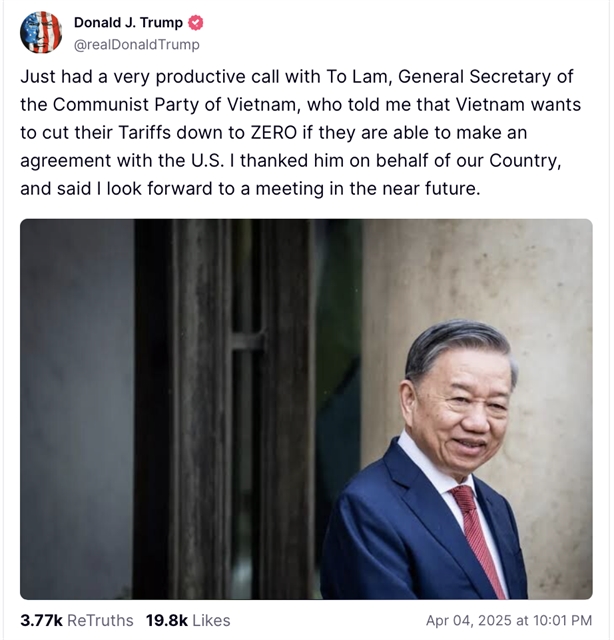 Economy
Economy

 |
| On April 4, 2025, US time, US President Donald Trump said he had just "had a very productive phone call" with General Secretary of the Communist Party of Vietnam Tô Lâm. Screenshot |
HÀ NỘI — Professor Carlyle A. Thayer of the University of New South Wales has assessed that the recent phone conversation between General Secretary Tô Lâm and U.S. President Donald Trump represents a significant move, showing that the newly imposed U.S. tariffs are open to negotiation and positioning Việt Nam as one of the first countries to respond proactively.
During the call, Việt Nam proposed removing tariffs on U.S. goods while urging the U.S. to do the same for Vietnamese goods, just two days after Trump’s announcement of a massive 46 per cent tariff on Vietnamese imports into the U.S.
According to Thayer, who is also an expert in Southeast Asian security and diplomacy, Việt Nam had been working diligently to develop a strategic response to the U.S. tariffs, which pose risks to the country’s economic growth targets.
“Việt Nam was undoubtedly surprised when Trump imposed a hefty 46 per cent tariff on all Vietnamese goods, giving an advantage to competitors such as India, Thailand and Malaysia in the textile, footwear and electronic goods sectors,” Thayer said. “In one move, Trump threatened Việt Nam’s goal of reaching 8 per cent growth in GDP next year — needed to boost Việt Nam to a middle-income country by 2030.”
Even before the call, Việt Nam had already announced its intention to remove tariffs on select U.S. goods and to increase imports of American liquefied natural gas (LNG) and aircraft. The government also hosted a delegation of nearly 60 American companies to explore investment opportunities.
The Australian professor highlighted the importance of President Trump agreeing to take General Secretary Tô Lâm’s call: “It is significant that President Trump took General Secretary Tô Lâm’s phone call in the first place. Lâm’s offer to cut all tariffs to zero percent led Trump to describe the conversation as ‘very productive.’”
Thayer added that the two leaders reached a verbal agreement to initiate discussions on the matter.
“Việt Nam was already preparing to dispatch its Deputy Prime Minister Hồ Đức Phớc to Washington. Minister Phớc’s visit will be timely, as Tô Lâm has already laid Việt Nam’s cards on the table — zero tariffs on American goods, including agricultural products, significant increases in Vietnamese purchases from the U.S., such as Boeing aircraft, and investment opportunities for U.S. companies in high-tech and critical minerals in Việt Nam.”
Thayer noted that the outcome of the call suggests a willingness on the part of the U.S. to enter into discussions.
“Before the phone call, the question was whether Trump’s Liberation Day tariffs were negotiable or non-negotiable. Now we know — they are negotiable,” he said. “This will have a major positive impact on the market.”
He also pointed to the broader implications, given Việt Nam’s sizeable trade surplus with the U.S.
“This development is important because Việt Nam has the third-largest trade surplus with the U.S., after China and Mexico,” Thayer said. “Việt Nam gets to benefit because it is the first mover.” — VNS



.jpg)
